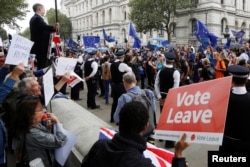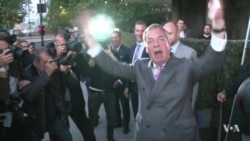After widespread allegations of Russian interference in the 2016 U.S. Presidential election, the first evidence is emerging of possible attempts by Moscow to influence Britain's referendum on leaving the European Union.
Researchers have identified thousands of social media accounts that promoted anti-EU messages or sought to whip up political and racial tensions.
The investigation by the University of California, Berkeley and Britain's Swansea University shows in the two days leading up to the "Leave" victory in June 2016, Twitter accounts based in Russia posted almost 45,000 messages about Brexit, most of them anti-EU.
The next day, the majority went silent. By far the majority of the accounts had not previously engaged in the Brexit debate but had instead focused on other issues like the conflict in Ukraine.
Britain's Electoral Commission and a committee of lawmakers have launched separate investigations into fake news and the role of social media, as the new evidence emerges.
"Russia is interfering, and it is doing so to try to undermine public confidence in political institutions and in the mainstream media in Western countries. We have to regard the spread of fake news propagated by fake accounts across Twitter and Facebook in this way as a real threat to our democracy," said Conservative MP Damian Collins, Chairman of the Parliamentary Culture, Media and Sport Committee and head of the investigation.
U.S. spy agencies say Russia directed a campaign of propaganda to disrupt the 2016 presidential election. Russian President Vladimir Putin has denied interfering.After meeting Putin last week, U.S. President Donald Trump said he believed his Russian counterpart.
Speaking Tuesday, British Prime Minister Theresa May had a very different message for Moscow.
"It is seeking to weaponize information," she said, "deploying its state-run media organizations to plant fake stories and photo-shopped images in an attempt to sow discord in the West and undermine our institutions. So, I have a very simple message for Russia. We know what you are doing. And you will not succeed."
Watch Ridgwell's Report:
In one such fake story, a Twitter user posting under the handle "South Lone Star" and purportedly from Texas, posted a photo of a Muslim woman apparently ignoring a victim of the March Westminster terror attack. But other unseen images, corroborated by the photographer, showed the woman clearly traumatized. Twitter has since revealed the account was operated out of Russia.
"Why would someone do that? They are doing that to try and create racial tensions," said Collins. "My fear is this practice is probably far more widespread than we currently know."
Twitter has handed the US Congress details of nearly 3,000 accounts linked to Russia's shady Internet Research Agency, based in St Petersburg, where it's alleged hundreds of people work 24 hours a day to create and spread propaganda. And it's not just humans at work.
Researchers at City University of London have uncovered a network of 13,500 automated Twitter accounts or "bots" operating at the time of the Brexit vote.
Lead researcher Dr. Marco Bastos said they were "directed at re-tweeting, replicating content of real world users - users who were very polarized, users who were tweeting messages that included a strong hyper-partisan,' as we call it, component. This is not your usual Joe that is talking about Brexit."
With their thousands of followers, Bastos said those Twitter bots have a marketable value and can be renamed and re-purposed for a new campaign.
The researchers praise Twitter for making its data available to the public, but say Facebook is far more secretive.
The City University research did not look at where the bots originate. But lawmakers in both Europe and the United States say the Kremlin appears to be using social media to sow division.
Twitter and Facebook say they are complying with investigations, but pressure is growing for them to do more.







